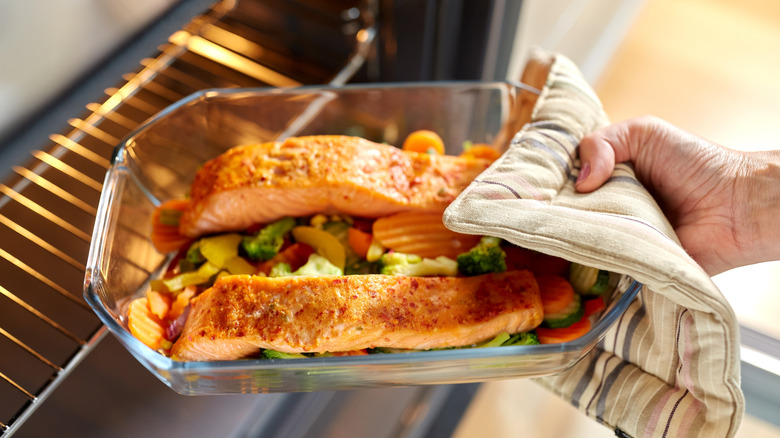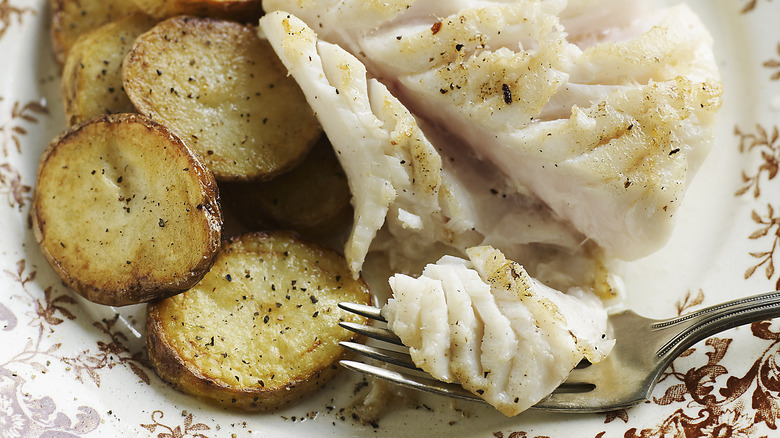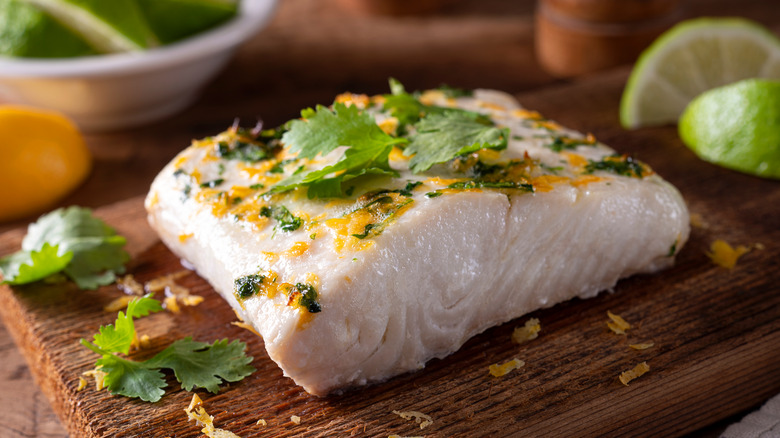Does Fish Need The Same Amount Of Resting That Meat Does?
Many recipes call for meat to rest for several minutes after cooking and before serving. This guidance, however, is not one-size-fits-all and does not always apply to fish.
For meats, the resting process prevents liquid from pouring out of the meat as soon as you cut into it. According to Chef Angie Mar (via Martha Stewart), "When meat is hot, the juices are more liquid. When you cut into a very hot piece of meat, all of the liquid is going to come out. If you rest it, it allows everything to relax and redistribute the juices, which creates a more tender, juicier cut." Resting times depend on the type of meat, the cut, and the cooking method, but in general, meat needs to rest for 10 to 20 minutes to give its moisture time to redistribute.
Fish, on the other hand, has a different set of rules. Too long of a rest can cause fish to get cold or even lose liquid. Like meat, different types of fish are impacted differently by resting, but in general, fish may not need to rest at all, and if it does, it should not rest as long as meat.
Resting rules for fish
When it comes to resting fish after cooking, the type of fish is a major consideration. Most lean white fish, including cod, tilapia, grouper, and bass, should not rest because they do not have enough connective tissue to prevent them from falling apart. If left to rest, these filets will likely flake apart and cool quickly. You also shouldn't allow tuna steaks to rest, since these are often served raw in the center and risk overcooking if left to rest.
Salmon and other fatty fish that have more connective tissue are a different story. These types of fish may benefit from a five to 10-minute covered resting period, especially when used to prevent overcooking. Salmon can go from raw to overcooked quickly. It continues to cook after it is removed from heat, so even if you take the fish off the stove or out of the oven once it has reached your preferred internal temperature (125 degrees Fahrenheit for medium-rare and 145 for well done), it could be too late. For this reason, many recipes advise pulling salmon off heat just before it is finished and allowing it to come to its final temperature as it rests.
Other differences between fish and meat
Aside from resting times, there are several differences between cooking fish and meat. Meat needs to be tenderized while fish does not; fish usually cooks faster than meat; and fish becomes much flakier and is at higher risk of falling apart during cooking than most meats.
Another difference between meat and fish is marinating. While most meats will benefit from several hours of marinating and become more flavorful and tender with time, fish should be marinated for shorter periods. Usually, around 15 to 30 minutes is ideal for a flaky fish and up to an hour will work for a firmer fish like halibut or tuna.
Fish can be challenging to cook correctly, but an important first step to achieving a flaky, juicy, and perfectly cooked fish is not treating it like other meats. In general, fish requires eight to nine minutes of cooking per inch of thickness, but it's a good idea to check it frequently with a meat thermometer to avoid overcooking. Typically, you can tell that fish is done when it firms up, becomes more opaque, and has a flaky texture.


